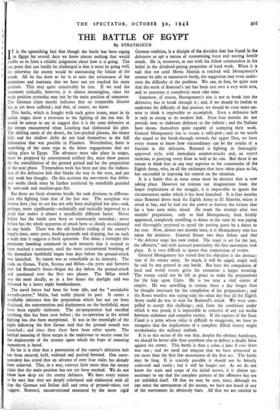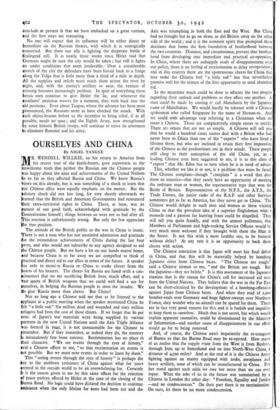THE BATTLE OF EGYPT
By STRATEGICUS
IT is the a.§tonishing fact that though the battle has been raging in Egypt for several days we know almost nothing that would enable us to form a reliable judgement about how it is going. The one point that can hardly be challenged is that it must be going well, for otherwise the enemy would be announcing the failure of the attack. All he has done so far is to note the seriousness of the operations and maintain that we have not yet reached his main position. This may quite conceivably be true. If we read the statement critically, however, it is almost meaningless, since the main position yesterday may not be the main position of tomorrow. The German claim merely indicates that no irreparable disaster has as yet been suffered ; and that, of course, we know.
This battle, which is fraught with such grave issues, must in its earlier stages show a reversion to the fighting of the last war. It would be untrue to say or suggest that it is the same defensive as the troops encountered when Lossberg had elaborated his plan. The shifting sands of the desert, the low-pitched plateau, the minor hills and the shallow clefts do not lend themselves to the full elaboration that was possible in Flanders. Nevertheless, there is something of the same type in the bitter engagements that are taking place in Egypt. The advances must take place in surges, must be prepared by concentrated artillery fire, must show pauses for the consolidation of the ground gained and for the preparation of the next phase. Tremendous work has been put into the elabora- tion of the defensive belt that blocks the way to the west, and not only work but thought. On this occasion the movement that defen- sive works check must be further restricted by minefields guarded by anti-tank and machine-gun fire.
But there are fresh elements beside the tank divisions to differen- tiate this fighting from that of the last war. The aeroplane was known then ; but its use has not only been multiplied but also—and, perhaps, more significantly—technically and tactically improved to a pitch that makes it almost a specifically different factor. Never before has the battle area been so enormously extended ; never before has the whole apparatus of attack been so closely co-ordinated in any battle. There was the old familiar raiding of the enemy's supp)r-lines, entry ports, landing-grounds and shipping, but on such a scale that it suggests a fresh operation. For about a fortnight this persistent bombing continued in such intensity that it seemed to have reached a maximum, until the more concentrated bombing of the immediate battlefield began four days before the ground-attack was launched. Its extent was as remarkable as its intensity. The raids on Genoa, Turin, Savona and Milan—the ports and factories that fed Rommel's force—began the day before the ground-attack and continued over the first two phases. The Milan attack was the most deadly, as in a few hours the daylight raid was followed by a heavy night bombardment.
The naval forces had been far from idle, and the "unsinkable aircraft-carrier," Malta, had nobly played its part. It seems a justifiable inference that the preparation which has not yet been disclosed, the concentration and deployment on the battlefield, must have been equally elaborate. The air-preparation had excelled anything that has been seen before ; the co-operation in the actual fighting has also been exceptional. It was in the moonlight of the night following the first Genoa raid that the ground assault was launched ; and since then there have been other spurts. The tactical meaning of these surges is the endeavour to secure room for the deployment of the armour upon which the hope of restoring manoeuvre is based.
So far it is clear that a penetration of the enemy's defensive belt has been secured, held, widened and pushed forward. One corre- spondent has stated that an advance of over four miles has already been achieved. This, in a way, conveys little more than the enemy claim that the main position has not yet been reached. We do not know how deep are the enemy defences. We have every reason to be sure that they are deeply echeloned and elaborated with all that the German and Italian skill and sense of ground-values can suggest. Rorrunel, unconventional measured by the more rigid German tradition, is a disciple of the doctrine that has found In the defensive so apt a means of economising force and snaring host& attack. He is, moreover, at one with his fellow commanders in his belief in the dividend-paying properties of hard work. When it is said that not until Mersa Matruh is reached will Montgomery's armour be able to manoeuvre freely, the suggestion may even under- state the difficulty of the problem. We can, in fine, be quite sure that the mesh of Rommel's net has been cast over a very wide area, and to penetrate it completely must take time.
Somehow, of course, Montgomery's aim is not to break into the defensive, but to break through it ; and, if we should be foolish to underrate the difficulty of that process, we should be even more un- wise to think it impossible to accomplish. Even a defensive belt is only as strong as its weakest link. Even four months do not provide time to elaborate defences to the infinite ; and the Italians have shown themselves quite capable of scamping their work. General Montgomery has to secure a sally-port ; and as we watch the sequel to the break-through towards the upper Don, we have every reason to know how extraordinary can be the results of a fracture in the defensive. Rommel is fighting in thoroughly approved style, with immediate counter-attacks and, an expert tactician, is parrying every blow as well as he can. But there is no reason to think him in any way superior to the commander of the Eighth Army, who, in all the exchanges that have taken place so far, has .succeeded in imposing his control on the situation.
It is a battle that in some sense must be decisive that is now taking place. However we restrain our imaginations from the larger implications of the struggle, it is impossible to ignore the circumstances under which it has been launched. It is four months since Rommel drove back the Eighth Army to El Alamein, where it stood at bay, and he had not the power to harvest the victory that lay a bare sixty miles ahead. He made the attempt after two months' preparation, only to find Montgomery, then freshly appointed, completely unwilling to dance to the tune he was piping and thoroughly prepared to speed the parting guest by a threat to his rear. Now, almost two months later, it is Montgomery who has taken the initiative. General Smuts two days before said that " the defence stage has now ended. The stage is set for the last, the offensive," and with unusual punctuality the first movement took place. It is very difficult to ignore that conjunction of events.
General Montgomery has stated that his objective is the destruc- tion of the enemy army. So much, it will be urged, might well be said by any general in any battle. But here the compulsion of local and world events gives the statement a larger meaning. The enemy could not be left in peace to make his preparations for the leap upon Cairo. He is too near a vital centre of empire. He was unwilling to remain there a day longer than he thought necessary for the completion of his preparations ; and the Rome wireless was saying only the other day that all the Eighth Army could do was to wait for Rommel's attack. We were com- pelled to accept this challenge ; and, from the conditions under which it was posed, it is impossible to conceive of any via media between stalemate and complete victory. If the capture of the Suez Canal is a prize whose value is difficult to exaggerate, we have to recognise that the implications of a complete Allied, victory might revolutionise the military outlook.
It is in this sector of the war that, despite the obvious handicaps, we should be better able than anywhere else to deliver a deadly blow against the enemy. This battle is then a scene a faire if ever there was one ; and we need not imagine that we have witnessed as yet more than the first few movements of the first act. The battle may be long. It is scarcely possible it should not be bitterly contested and costly ; but it will be fought out. As we do not know the scale and scope of the initial moves, it is almost un- necessary to say that the complete pattern of the offensive has not yet unfolded itself. Of that we may be sure, since, although we can sense the nervousness of the enemy, we have not heard of any of the movements he obviously fears. All that we are entitled to conclude at present is that we have embarked on a great venture, and the first steps are reassuring.
No one will expect that its influence will be either direct or Immediate on the Russian theatre, with which it is strategically connected. But there our ally is fighting the desperate battle at Stalingrad still. It is nearly three weeks since Hitler said that Germans might be sure the city would be taken ; but still it fights on under conditions that seem intolerable. Over a considerable stretch of the city the defenders have been forced back to a fringe *long the Volga that is little more than a third of a mile in depth. All the supplies and reliefs must reach them across the river by night, and, with the enemy's artillery so near, the venture of crossing becomes increasingly perilous. In spite of everything these heroic men continue to give Hitler the lie, and whenever the assailants' attention wavers for a moment, they rush back into the old positions. Even about Tuapse, where the advance has been most pronounced, the Russians seem to have checked the attack. With such object-lessons before us the incentive to bring relief, if at all possible, needs no spur ; and the Eighth Army, now strengthened by some historic British troops, will continue to strive its uttermost to eliminate Rommel and his army.



























 Previous page
Previous page